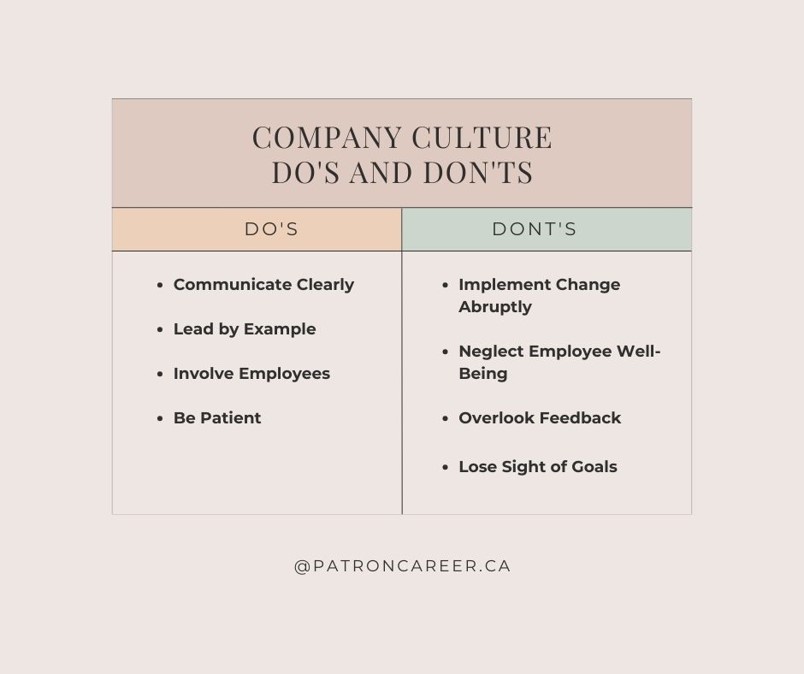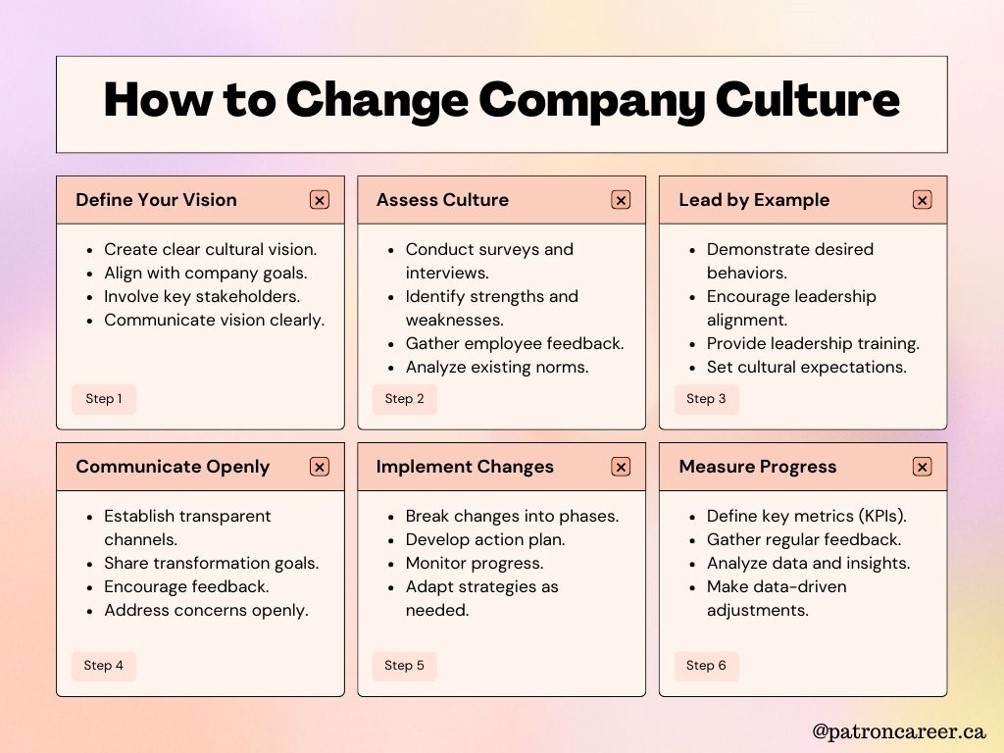
Navigating Feedback
30 August, 2023
Patron Career Staffing firmly believes in adopting a tailored approach to meet temporary and permanent recruitment needs. We safeguard the interest of our clients by finding such workers who are knowledgeable and reliable.
About UsNeed help? Make a Call
32 Dundas Street East Unit A, L5A1W2

Abstract: Unlock the power of cultural transformation! In today's dynamic business landscape, your company's culture can be a game-changer. This blog is your roadmap to harnessing its potential. Discover what cultural transformation means and why it's pivotal for modern businesses. We've distilled it into five actionable steps:
1. Define Vision: Craft a powerful cultural vision aligned with your goals.
2. Assess Culture: Evaluate your current culture, pinpointing strengths and areas for growth.
3. Lead by Example: Be the cultural compass; exemplify desired behaviours as a leader.
4. Communicate Openly: Foster transparency and open dialogue for all.
5. Implement Changes: Gradually introduce shifts for a seamless transformation.
Join us on this transformative journey towards a more innovative, engaged, and resilient organizational culture. Success awaits!
This decade has seen several breakthroughs in technology, innovations and human resources. Everything boils down to the human factor because ultimately, humans practically run the show. This axiom paves the way for a transformed culture in an organization. Company culture is not just a buzzword, but a powerful driver of zeal, employee engagement, productivity and overall business performance. But imagine what could happen if your company culture became the hurdle that holds you back instead of propelling you forward? Enraging, right? This is where the cultural transformation of a company comes into play.
Moving ahead, will discuss what cultural transformation looks like and how it can be successfully achieved in 5 manageable steps. Let's dive right in!
Defining Cultural Transformation
It's pertinent to be abridged by understanding what cultural transformation overtly means. Cultural transformation refers to a deliberate and comprehensive shift in an organization's values, beliefs, behaviours, and norms. It involves reshaping the way employees think, act, and interact within the workplace. Cultural transformation is often necessary when a company needs to adapt to new market dynamics, respond to evolving customer expectations, or simply remain competitive in a changing world.

The Role of Cultural Transformation in Modern Businesses
The role of cultural transformation in modern businesses is of paramount importance. In today's rapidly evolving world, where industries are constantly disrupted, technology advances rapidly, and customer expectations change, having a flexible and adaptive culture is crucial for success. Here's how cultural transformation plays a significant role:
1. Adaptability and Innovation: Modern businesses need to adapt quickly to new challenges and opportunities. A culture that encourages innovation, risk-taking, and continuous learning is essential for staying ahead of the curve.
2. Enhanced Employee Engagement: A positive and supportive culture fosters higher levels of employee engagement. When employees feel valued, empowered, and connected to the organization's mission, they are more likely to be productive and committed.
3. Improved Collaboration: Cultural transformation can break down silos and encourage cross- functional collaboration. Modern businesses often require teams from different departments to work together, and a culture that supports collaboration can enhance efficiency and creativity.
4. Better Customer Experience: A customer-centric culture is vital in today's business landscape. Cultural transformation can lead to a heightened focus on customer needs, which can result in improved products, services, and overall customer satisfaction.
5. Talent Attraction and Retention: Millennials and Gen Z employees, who form a significant part of the modern workforce, often seek workplaces with a positive and inclusive culture. Cultural transformation can make your organization more attractive to top talent and reduce turnover.

Step 1: Define Cultural Transformation
Cultural transformation is about making a deliberate and comprehensive shift in how your organization's values, beliefs, behaviours, and norms operate. This shift is not superficial; it goes to the core of how your company functions. Cultural transformation often becomes necessary when a company finds that its existing culture is no longer conducive to achieving its goals or adapting to changes in the business landscape. It's like changing the DNA of your organization, as it impacts everything from employee interactions to decision-making processes.
Step 2: Assess Your Current Culture
To begin the transformation process, you need to understand where you are starting from. Conduct thorough assessments of your current culture. This could involve surveys, focus groups, one-on-one interviews, or even third-party assessments. Look at both the explicit and implicit aspects of your culture. What are the stated values in your mission statement, and do they align with the daily behaviours and attitudes of your employees? Identify what's working well in your current culture and what areas need improvement. This assessment serves as the baseline for measuring progress.
Step 3: Define Your Desired Culture
Once you have a clear understanding of your current culture, it's time to paint a picture of what you want your culture to be. Your desired culture should be informed by your business objectives and long-term goals. Consider the values, behaviours, and norms that will support these goals. For example, if innovation is a priority, your culture should encourage risk-taking and experimentation. It's crucial to communicate this vision effectively to all employees so they can align their efforts accordingly.
Step 4: Lead by Example
Cultural transformation cannot occur without the active participation of leadership. Leaders need to exemplify the values and behaviours they want to see in the organization. They should not only talk the talk but also walk the walk. This means leaders need to consistently display the desired cultural traits in their actions, decisions, and interactions. Furthermore, they should actively engage with employees, seeking their input and feedback. This openness and transparency help build trust and foster a sense of ownership among employees.
Step 5: Implement and Reinforce Change
Implementing cultural change requires a well-thought-out plan. This plan should include specific initiatives, training programs, and communication strategies. It's important to create a roadmap that outlines how you will transition from your current culture to the desired one. Assign responsibilities, allocate resources, and establish metrics to measure progress. Regularly communicate the progress and successes of the cultural transformation to keep employees engaged and motivated.
Ultimately
All organisations should understand that company culture isn’t just a buzzword. It’s an ongoing process that requires continuous effort and commitment. You may be subjected to resistance and setbacks along the way, but stay focused on the long-term benefits. With persistence, dedication, and a clear roadmap, you can successfully change your company culture to align with your vision and organizational objectives, ultimately driving greater success in the modern business landscape.
Stay tuned for more.
